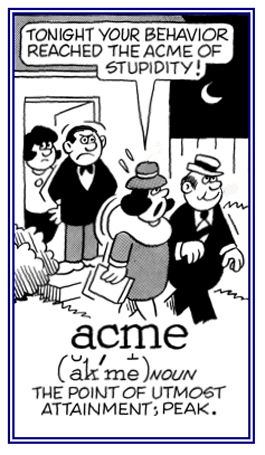acme, -acmic
(Greek: highest point; prime, best time)
2. In medicine, the crisis or critical stage of a disease: After putting off going to her doctor, Janice finally decided to see him and the results of the tests indicated that her affliction was at its acme, and so the doctor suggested that she wait until after her recovery before she attempted to go back to work.

Go to this Word A Day Revisited Index
so you can see more of Mickey Bach's cartoons.
Eliza winced as if she were experiencing acmesthesia even before the doctor gave her an injection.
2. Concerning a period where an aquatic group goes through seasonal changes: In her ecology class, Ivy learned about how marine organisms undergo the acmic time of transitional changes of the seasons.
2. Localized skin inflammation as a result of over activity of the oil glands at the base of hair follicles: Acne appears when oil (sebaceous) glands come to life around puberty when these glands are stimulated by male hormones that are produced in the adrenal glands of both boys and girls.
The oil glands, which are located just beneath the skin, continuously produce and secrete oil through openings in the skin. The oil lubricates and protects the skin.
Under certain circumstances, cells that are close to the openings of the oil glands block the openings. This causes a buildup of oil underneath the skin.
Certain bacteria feast on this oil, multiply, and cause the surrounding tissues to become inflamed.
If the inflammation is near the surface, a person will get a pustule. If it's deeper, it is called a papule (pimple). And if still deeper, it is termed a cyst.
If the oil breaks though to the surface, the result is a "whitehead". If the oil becomes oxidized (that is, acted on by oxygen in the air), the oil changes from white to black, and the result is a "blackhead".
A small needlelike structure like one of the silicate or calcium carbonate processes holding up the soft tissue of certain invertebrates, especially sponges.
2. The point when the crisis of a fever is over; paracmasis: After being very sick, Judy was happy when finally the doctor said that the paracme of her illness was past.
